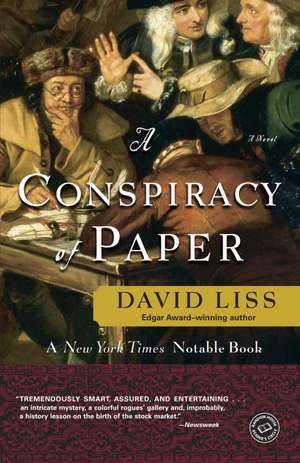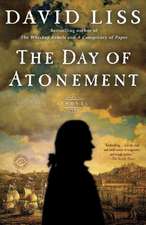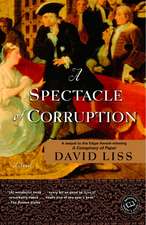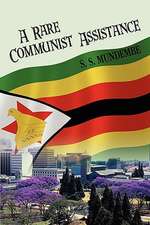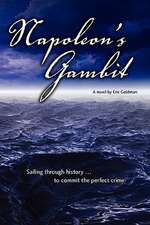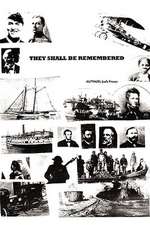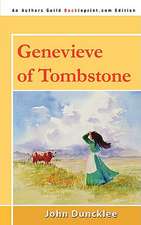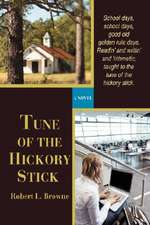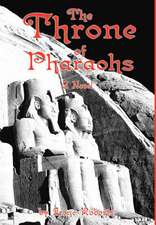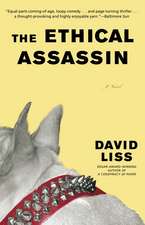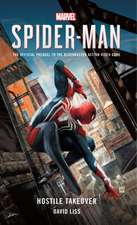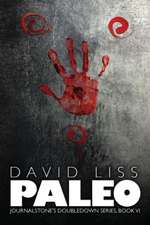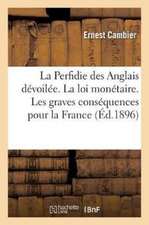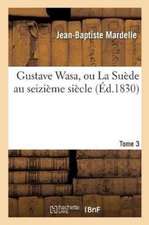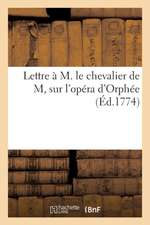The Coffee Trader: Ballantine Reader's Circle
Autor David Lissen Limba Engleză Paperback – 31 ian 2004
Miguel enters into a partnership with a seductive Dutchwoman who offers him one last chance at success—a daring plot to corner the market of an astonishing new commodity called “coffee.” To succeed, Miguel must risk everything he values and face a powerful enemy who will stop at nothing to see him ruined. Miguel will learn that among Amsterdam’s ruthless businessmen, betrayal lurks everywhere, and even friends hide secret agendas.
| Toate formatele și edițiile | Preț | Express |
|---|---|---|
| Paperback (2) | 54.54 lei 3-5 săpt. | +28.80 lei 4-10 zile |
| Little Brown Book Group – 6 mar 2003 | 54.54 lei 3-5 săpt. | +28.80 lei 4-10 zile |
| BALLANTINE BOOKS – 31 ian 2004 | 116.64 lei 3-5 săpt. |
Din seria Ballantine Reader's Circle
-
 Preț: 97.74 lei
Preț: 97.74 lei -
 Preț: 120.15 lei
Preț: 120.15 lei -
 Preț: 107.27 lei
Preț: 107.27 lei -
 Preț: 121.12 lei
Preț: 121.12 lei -
 Preț: 126.98 lei
Preț: 126.98 lei -
 Preț: 113.15 lei
Preț: 113.15 lei -
 Preț: 115.32 lei
Preț: 115.32 lei -
 Preț: 98.56 lei
Preț: 98.56 lei -
 Preț: 99.83 lei
Preț: 99.83 lei -
 Preț: 129.37 lei
Preț: 129.37 lei -
 Preț: 114.71 lei
Preț: 114.71 lei -
 Preț: 65.81 lei
Preț: 65.81 lei -
 Preț: 116.57 lei
Preț: 116.57 lei -
 Preț: 91.96 lei
Preț: 91.96 lei -
 Preț: 90.35 lei
Preț: 90.35 lei -
 Preț: 120.71 lei
Preț: 120.71 lei -
 Preț: 139.70 lei
Preț: 139.70 lei -
 Preț: 110.76 lei
Preț: 110.76 lei -
 Preț: 127.70 lei
Preț: 127.70 lei -
 Preț: 116.55 lei
Preț: 116.55 lei -
 Preț: 112.52 lei
Preț: 112.52 lei -
 Preț: 109.71 lei
Preț: 109.71 lei -
 Preț: 111.51 lei
Preț: 111.51 lei -
 Preț: 111.17 lei
Preț: 111.17 lei -
 Preț: 121.22 lei
Preț: 121.22 lei -
 Preț: 104.66 lei
Preț: 104.66 lei -
 Preț: 106.23 lei
Preț: 106.23 lei -
 Preț: 123.90 lei
Preț: 123.90 lei -
 Preț: 118.73 lei
Preț: 118.73 lei -
 Preț: 126.88 lei
Preț: 126.88 lei -
 Preț: 112.64 lei
Preț: 112.64 lei -
 Preț: 110.96 lei
Preț: 110.96 lei -
 Preț: 128.86 lei
Preț: 128.86 lei -
 Preț: 124.72 lei
Preț: 124.72 lei -
 Preț: 128.86 lei
Preț: 128.86 lei -
 Preț: 122.76 lei
Preț: 122.76 lei -
 Preț: 122.64 lei
Preț: 122.64 lei -
 Preț: 133.06 lei
Preț: 133.06 lei -
 Preț: 132.06 lei
Preț: 132.06 lei -
 Preț: 109.73 lei
Preț: 109.73 lei -
 Preț: 93.82 lei
Preț: 93.82 lei -
 Preț: 101.06 lei
Preț: 101.06 lei -
 Preț: 85.08 lei
Preț: 85.08 lei -
 Preț: 85.13 lei
Preț: 85.13 lei -
 Preț: 79.16 lei
Preț: 79.16 lei -
 Preț: 88.39 lei
Preț: 88.39 lei -
 Preț: 99.83 lei
Preț: 99.83 lei -
 Preț: 92.83 lei
Preț: 92.83 lei -
 Preț: 87.43 lei
Preț: 87.43 lei
Preț: 116.64 lei
Nou
Puncte Express: 175
Preț estimativ în valută:
22.32€ • 24.24$ • 18.75£
22.32€ • 24.24$ • 18.75£
Carte disponibilă
Livrare economică 01-15 aprilie
Preluare comenzi: 021 569.72.76
Specificații
ISBN-13: 9780375760907
ISBN-10: 0375760903
Pagini: 432
Dimensiuni: 132 x 203 x 23 mm
Greutate: 0.34 kg
Ediția:Ballantine Trad.
Editura: BALLANTINE BOOKS
Seria Ballantine Reader's Circle
ISBN-10: 0375760903
Pagini: 432
Dimensiuni: 132 x 203 x 23 mm
Greutate: 0.34 kg
Ediția:Ballantine Trad.
Editura: BALLANTINE BOOKS
Seria Ballantine Reader's Circle
Notă biografică
David Liss is the author of A Conspiracy of Paper, winner of the 2000 Edgar Award for Best First Novel. He has a graduate degree in English literature from Columbia University, as well as an M.A. from Georgia State University and a B.S. from Syracuse University. He lives in San Antonio with his wife and daughter, and can be reached via his website, www.davidliss.com.
From the Hardcover edition.
From the Hardcover edition.
Extras
Chapter 1
It rippled thickly in the bowl, dark and hot and uninviting. Miguel
Lienzo picked it up and pulled it so close he almost dipped his nose
into the tarry liquid. Holding the vessel still for an instant, he
breathed in, pulling the scent deep into his lungs. The sharp odor of
earth and rank leaves surprised him; it was like something an apothecary
might keep in a chipped porcelain jar.
“What is this?” Miguel asked, working through his irritation by pushing
at the cuticle of one thumb with the nail of the other. She knew he had
no time to waste, so why had she brought him here for this nonsense? One
bitter remark after another bubbled up inside him, but Miguel let loose
with none of them. It wasn’t that he was afraid of her, but he often
found himself going to great lengths to avoid her displeasure.
He looked over and saw that Geertruid met his silent cuticle mutilation
with a grin. He knew that irresistible smile and what it meant: she was
mightily pleased with herself, and when she looked that way it was hard
for Miguel not to be mightily pleased with her too.
“It’s something extraordinary,” she told him, gesturing toward his bowl.
“Drink it.”
“Drink it?” Miguel squinted into the blackness. “It looks like the
devil’s piss, which would certainly be extraordinary, but I’ve no desire
to know what it tastes like.”
Geertruid leaned toward him, almost brushing up against his arm. “Take a
sip and then I’ll tell you everything. This devil’s piss is going to
make both our fortunes.”
It had begun not an hour earlier, when Miguel felt someone take hold of
his arm.
In the instant before he turned his head, he ticked off the unpleasant
possibilities: rival or creditor, an abandoned lover or her angry
relative, the Danish fellow to whom he’d sold those Baltic grain futures
with too enthusiastic a recommendation. Not so long ago the approach of
a stranger had held promise. Merchants and schemers and women had all
sought Miguel’s company, asking his advice, craving his companionship,
bargaining for his guilders. Now he wished only to learn in what new
shape disaster would unfold itself.
He never thought to stop walking. He was part of the procession that
formed each day when the bells of the Nieuwe Kerk struck two, signaling
the end of trading on the Exchange. Hundreds of brokers poured out onto
the Dam, the great plaza at Amsterdam’s center. They spread out along
the alleys and roads and canal sides. Along the Warmoesstraat, the
fastest route to the most popular taverns, shopkeepers stepped outside,
donning wide-brimmed leather hats to guard against damp that rolled in
from the Zuiderzee. They set out sacks of spices, rolls of linen,
barrels of tobacco. Tailors and shoemakers and milliners waved men
inside; sellers of books and pens and exotic trinkets cried out their
wares.
The Warmoesstraat became a current of black hats and black suits,
speckled only with the white of collars, sleeves, and stockings or the
flash of silver shoe buckles. Traders pushed past goods from the Orient
or the New World, from places of which no one had heard a hundred years
before. Excited like schoolboys set free of the classroom, the traders
talked of their business in a dozen different languages. They laughed
and shouted and pointed; they grabbed at anything young and female that
crossed their path. They took out their purses and devoured the
shopkeepers’ goods, leaving only coins in their wake.
Miguel Lienzo neither laughed nor admired the commodities set out before
him nor clutched at the soft parts of willing shop girls. He walked
silently, head down against the light rain. Today was, on the Christian
calendar, the thirteenth day of May, 1659. Accounts on the Exchange
closed each month on the twentieth; let a man make what maneuvers he
liked, none of it mattered until the twentieth, when the credits and
debits of the month were tallied and money at last changed hands. Today
things had gone badly with a matter of brandy futures, and Miguel now
had less than a week to pluck his fat from the fire or he would find
himself another thousand guilders in debt.
Another thousand. He already owed three thousand. Once he had made
double that in a year, but six months ago the sugar market collapsed,
taking Miguel’s fortune with it. And then–well, one mistake after
another. He wanted to be like the Dutch, who regarded bankruptcy as no
shame. He tried to tell himself it did not matter, it was only a little
while longer until he undid the damage, but believing that tale required
an increasing effort. How long, he wondered, until his wide and boyish
face turned pinched? How long until his eyes lost the eager sparkle of a
merchant and took on the desperate, hollow gaze of a gambler? He vowed
it would not happen to him. He would not become one of those lost souls,
the ghosts who haunted the Exchange, living from one reckoning day to
the next, toiling to secure just enough profit to keep their accounts
afloat for one more month when surely all would be made easy.
Now, with unknown fingers wrapped around his arm, Miguel turned and saw
a neatly dressed Dutchman of the middling ranks, hardly more than twenty
years of age. He was a muscular wide-shouldered fellow with blond hair
and a face almost more pretty than handsome, though his drooping
mustache added a masculine flair.
Hendrick. No family name that anyone had ever heard. Geertruid Damhuis’s
fellow.
“Greetings, Jew Man,” he said, still holding on to Miguel’s arm. “I hope
all goes well for you this afternoon.”
“Things always go well with me,” he answered, as he twisted his neck to
see if any prattling troublemaker might lurk behind him. The Ma’amad,
the ruling council among the Portuguese Jews, forbade congress between
Jews and “inappropriate” gentiles, and while this designation could
prove treacherously ambiguous, no one could mistake Hendrick, in his
yellow jerkin and red breeches, for anything appropriate.
“Madam Damhuis sent me to fetch you,” he said.
Geertruid had played at this before. She knew Miguel could not risk
being seen on so public a street as the Warmoesstraat with a Dutchwoman,
particularly a Dutchwoman with whom he did business, so she sent her man
instead. There was no less risk to Miguel’s reputation, but this way she
could force his hand without even showing her face.
“Tell her I haven’t the time for so lovely a diversion,” he said. “Not
just now.”
“Of course you do.” Hendrick grinned widely. “What man can say no to
Madam Damhuis?”
Not Miguel. At least not easily. He had difficulty saying no to
Geertruid or to anyone else–including himself–who proposed something
amusing. Miguel had no stomach for doom; disaster felt to him like an
awkward and loose suit. He had to force himself each day to play the
cautious role of a man in the throes of ruin. That, he knew, was his
true curse, the curse of all former Conversos: in Portugal he had grown
too used to falseness, pretending to worship as a Catholic, pretending
to despise Jews and respect the Inquisition. He had thought nothing of
being one thing while making the world believe he was another.
Deception, even self-deception, came far too easily.
“Thank your mistress but give her my regrets.” With reckoning day soon
upon him, and new debts to burden him, he would have to curb his
diversions, at least for a while. And there had been another note this
morning, a strange anonymous scrawl on a torn piece of paper. I want my
money. It was one of a half dozen or so Miguel had received in the last
month. I want my money. Wait your turn, Miguel would think glumly, as he
opened each of these letters, but he was unnerved by the terse tone and
uneven hand. Only a madman would send such a message without a name–for
how could Miguel respond even if he had the money and even if he were
inclined to use what little he had for something so foolish as paying
debts?
Hendrick stared, as though he couldn’t understand Miguel’s good, if
thickly accented, Dutch.
“Today is not the day,” Miguel said, a bit more forcefully. He avoided
speaking too adamantly to Hendrick, whom he had once seen slam a
butcher’s head into the stones of the Damplatz for selling Geertruid
rancid bacon.
Hendrick gazed at Miguel with the special pity men of the middle rank
reserved for their superiors. “Madam Damhuis told me to inform you that
today is the day. She tells me that she will show you something, and
when you set your eyes on it, you will forever after divide your life
into the time before this afternoon and the time after.”
The thought of her disrobing flashed before him. That would be a lovely
divide between the past and the future and would certainly be worth
setting aside his business for the afternoon. However, Geertruid loved
to play at these games. There was little chance she meant to take off as
much as her cap. But there was no getting rid of Hendrick, and urgent as
his troubles might be, Miguel could make no deals with this Dutchman
lurking in his shadow. It had happened before. He would trail Miguel
from tavern to tavern, from alley to canal side, until Miguel
surrendered. Best to have this over with, he decided, so he sighed and
said he would go.
With a sharp gesture of his neck, Hendrick led them off the ancient
cobbled street and across the steep bridges toward the new part of the
city, ringed by the three great canals–the Herengracht, the
Keizersgracht, and the Prinsengracht–and then toward the Jordaan, the
most rapidly growing part of town, where the air echoed with the ring of
hammer on anvil and the chipping of chisel on stone.
Hendrick led him along the waters of the Rozengracht, where barges
pierced the thick canal mist as they headed toward the docks to unload
their goods. The new houses of the newly wealthy stood on either side of
the murky water, facing the oak- and linden-lined waterway. Miguel had
once rented the better part of so fine a house, red-brick and
steeple-gabled. But then Brazilian production of sugar had far exceeded
Miguel’s expectations. He’d been gambling on low production for years,
but suddenly Brazilian farmers unleashed an unexpected crop, and in an
instant prices collapsed. A great man of the Exchange as instantly
became a debtor living off his brother’s scraps.
Once they departed from the main street, the Jordaan lost its charm. The
neighborhood was new–where they stood had been farmland only thirty
years before–but already the alleyways had taken on the decrepit cast of
a slum. Dirt replaced the cobblestones. Huts made of thatch and scraps
of wood leaned against squat houses black with tar. The alleys vibrated
with the hollow clacking of looms, as weavers spun from sunup until late
into the night, all in the hope of earning enough to keep their bellies
full for one more day.
In moments of weakness, Miguel feared that poverty would claim him as it
had claimed the wretched of the Jordaan, that he would fall into a well
of debt so deep he would lose even the dream of recovering himself.
Would he be the same man then–himself, yet penniless–or would he become
as hollow as the beggars and luckless laborers he passed on the streets?
He assured himself it would not happen. A true merchant never gives in
to gloom. A man who has lived as a Secret Jew always has one more trick
to save his skin. At least until he fell into the clutches of the
Inquisition, he reminded himself, and there was no Inquisition in
Amsterdam. Just the Ma’amad.
But what was he doing here with this inscrutable Dutchman? Why had he
allowed his will to collapse when he had business, important business,
to pursue?
“To what sort of place are you taking me?” Miguel asked, hoping to find
a reason to excuse himself.
“A miserable sort of place,” Hendrick said.
Miguel opened his mouth to voice an objection, but it was too late. They
had arrived.
Though he was not, like the Dutch, inclined to believe in omens, Miguel
would later recall that his venture had begun in a place called the
Golden Calf, surely an unpromising name. They climbed down a steep and
viciously low-ceilinged stairwell to the cellar, a little room that
might comfortably have held thirty souls but now contained perhaps
fifty. The choking smoke of cheap West Indian tobacco and musty peat
stoves nearly suppressed the scent of spilled beer and wine, old cheese,
and the odor of fifty unwashed men–or, rather, forty men and ten
whores–whose mouths puffed out onions and beer.
At the bottom of the stairs, an enormous man, shaped remarkably liked a
pear, blocked their passage, and sensing that someone wished to get by
he moved his bulk backwards to prevent anyone from squeezing past. He
held a tankard in one hand and a pipe in the other, and he shouted
something incomprehensible to his companions.
“Move your monstrous bulk, fellow,” Hendrick said to him.
The man turned his head just enough to register his scowl and then
looked away.
“Fellow”–Hendrick tried again–“you are the hard turd in the ass of my
journey. Don’t make me apply a purgative to flush you out.”
“Go piss in your breeches,” he answered, and then belched laughter in
his friends’ faces.
“Fellow,” said Hendrick, “turn around and see to whom you speak so
rudely.”
The man did turn around, and as he saw Hendrick the grin melted from his
jowly three-days-unshaved face. “Begging your pardon,” he said. He
pulled his cap down off his head and moved quickly out of the way,
knocking clumsily into his friends.
This newfound humility wasn’t enough to satisfy Hendrick, who reached
out like the lash of a whip and grabbed the man’s filthy shirt. The
tankard and pipe fell to the floor. “Tell me,” Hendrick said, “should I
crush your throat or not crush your throat?”
“Not crush,” the drunk suggested eagerly. His hands flapped like bird
wings.
“What do you say, Jew Man?” Hendrick asked Miguel. “Crush or not crush?”
“Oh, let him go,” Miguel answered wearily.
Hendrick released his grip. “The Jew Man says to let you go. You
remember that, fellow, next time you think to toss a dead fish or rotten
cabbage at a Jew. A Jew has saved your hide today, and for no good
reason, too.” He turned to Miguel. “This way.”
From the Hardcover edition.
It rippled thickly in the bowl, dark and hot and uninviting. Miguel
Lienzo picked it up and pulled it so close he almost dipped his nose
into the tarry liquid. Holding the vessel still for an instant, he
breathed in, pulling the scent deep into his lungs. The sharp odor of
earth and rank leaves surprised him; it was like something an apothecary
might keep in a chipped porcelain jar.
“What is this?” Miguel asked, working through his irritation by pushing
at the cuticle of one thumb with the nail of the other. She knew he had
no time to waste, so why had she brought him here for this nonsense? One
bitter remark after another bubbled up inside him, but Miguel let loose
with none of them. It wasn’t that he was afraid of her, but he often
found himself going to great lengths to avoid her displeasure.
He looked over and saw that Geertruid met his silent cuticle mutilation
with a grin. He knew that irresistible smile and what it meant: she was
mightily pleased with herself, and when she looked that way it was hard
for Miguel not to be mightily pleased with her too.
“It’s something extraordinary,” she told him, gesturing toward his bowl.
“Drink it.”
“Drink it?” Miguel squinted into the blackness. “It looks like the
devil’s piss, which would certainly be extraordinary, but I’ve no desire
to know what it tastes like.”
Geertruid leaned toward him, almost brushing up against his arm. “Take a
sip and then I’ll tell you everything. This devil’s piss is going to
make both our fortunes.”
It had begun not an hour earlier, when Miguel felt someone take hold of
his arm.
In the instant before he turned his head, he ticked off the unpleasant
possibilities: rival or creditor, an abandoned lover or her angry
relative, the Danish fellow to whom he’d sold those Baltic grain futures
with too enthusiastic a recommendation. Not so long ago the approach of
a stranger had held promise. Merchants and schemers and women had all
sought Miguel’s company, asking his advice, craving his companionship,
bargaining for his guilders. Now he wished only to learn in what new
shape disaster would unfold itself.
He never thought to stop walking. He was part of the procession that
formed each day when the bells of the Nieuwe Kerk struck two, signaling
the end of trading on the Exchange. Hundreds of brokers poured out onto
the Dam, the great plaza at Amsterdam’s center. They spread out along
the alleys and roads and canal sides. Along the Warmoesstraat, the
fastest route to the most popular taverns, shopkeepers stepped outside,
donning wide-brimmed leather hats to guard against damp that rolled in
from the Zuiderzee. They set out sacks of spices, rolls of linen,
barrels of tobacco. Tailors and shoemakers and milliners waved men
inside; sellers of books and pens and exotic trinkets cried out their
wares.
The Warmoesstraat became a current of black hats and black suits,
speckled only with the white of collars, sleeves, and stockings or the
flash of silver shoe buckles. Traders pushed past goods from the Orient
or the New World, from places of which no one had heard a hundred years
before. Excited like schoolboys set free of the classroom, the traders
talked of their business in a dozen different languages. They laughed
and shouted and pointed; they grabbed at anything young and female that
crossed their path. They took out their purses and devoured the
shopkeepers’ goods, leaving only coins in their wake.
Miguel Lienzo neither laughed nor admired the commodities set out before
him nor clutched at the soft parts of willing shop girls. He walked
silently, head down against the light rain. Today was, on the Christian
calendar, the thirteenth day of May, 1659. Accounts on the Exchange
closed each month on the twentieth; let a man make what maneuvers he
liked, none of it mattered until the twentieth, when the credits and
debits of the month were tallied and money at last changed hands. Today
things had gone badly with a matter of brandy futures, and Miguel now
had less than a week to pluck his fat from the fire or he would find
himself another thousand guilders in debt.
Another thousand. He already owed three thousand. Once he had made
double that in a year, but six months ago the sugar market collapsed,
taking Miguel’s fortune with it. And then–well, one mistake after
another. He wanted to be like the Dutch, who regarded bankruptcy as no
shame. He tried to tell himself it did not matter, it was only a little
while longer until he undid the damage, but believing that tale required
an increasing effort. How long, he wondered, until his wide and boyish
face turned pinched? How long until his eyes lost the eager sparkle of a
merchant and took on the desperate, hollow gaze of a gambler? He vowed
it would not happen to him. He would not become one of those lost souls,
the ghosts who haunted the Exchange, living from one reckoning day to
the next, toiling to secure just enough profit to keep their accounts
afloat for one more month when surely all would be made easy.
Now, with unknown fingers wrapped around his arm, Miguel turned and saw
a neatly dressed Dutchman of the middling ranks, hardly more than twenty
years of age. He was a muscular wide-shouldered fellow with blond hair
and a face almost more pretty than handsome, though his drooping
mustache added a masculine flair.
Hendrick. No family name that anyone had ever heard. Geertruid Damhuis’s
fellow.
“Greetings, Jew Man,” he said, still holding on to Miguel’s arm. “I hope
all goes well for you this afternoon.”
“Things always go well with me,” he answered, as he twisted his neck to
see if any prattling troublemaker might lurk behind him. The Ma’amad,
the ruling council among the Portuguese Jews, forbade congress between
Jews and “inappropriate” gentiles, and while this designation could
prove treacherously ambiguous, no one could mistake Hendrick, in his
yellow jerkin and red breeches, for anything appropriate.
“Madam Damhuis sent me to fetch you,” he said.
Geertruid had played at this before. She knew Miguel could not risk
being seen on so public a street as the Warmoesstraat with a Dutchwoman,
particularly a Dutchwoman with whom he did business, so she sent her man
instead. There was no less risk to Miguel’s reputation, but this way she
could force his hand without even showing her face.
“Tell her I haven’t the time for so lovely a diversion,” he said. “Not
just now.”
“Of course you do.” Hendrick grinned widely. “What man can say no to
Madam Damhuis?”
Not Miguel. At least not easily. He had difficulty saying no to
Geertruid or to anyone else–including himself–who proposed something
amusing. Miguel had no stomach for doom; disaster felt to him like an
awkward and loose suit. He had to force himself each day to play the
cautious role of a man in the throes of ruin. That, he knew, was his
true curse, the curse of all former Conversos: in Portugal he had grown
too used to falseness, pretending to worship as a Catholic, pretending
to despise Jews and respect the Inquisition. He had thought nothing of
being one thing while making the world believe he was another.
Deception, even self-deception, came far too easily.
“Thank your mistress but give her my regrets.” With reckoning day soon
upon him, and new debts to burden him, he would have to curb his
diversions, at least for a while. And there had been another note this
morning, a strange anonymous scrawl on a torn piece of paper. I want my
money. It was one of a half dozen or so Miguel had received in the last
month. I want my money. Wait your turn, Miguel would think glumly, as he
opened each of these letters, but he was unnerved by the terse tone and
uneven hand. Only a madman would send such a message without a name–for
how could Miguel respond even if he had the money and even if he were
inclined to use what little he had for something so foolish as paying
debts?
Hendrick stared, as though he couldn’t understand Miguel’s good, if
thickly accented, Dutch.
“Today is not the day,” Miguel said, a bit more forcefully. He avoided
speaking too adamantly to Hendrick, whom he had once seen slam a
butcher’s head into the stones of the Damplatz for selling Geertruid
rancid bacon.
Hendrick gazed at Miguel with the special pity men of the middle rank
reserved for their superiors. “Madam Damhuis told me to inform you that
today is the day. She tells me that she will show you something, and
when you set your eyes on it, you will forever after divide your life
into the time before this afternoon and the time after.”
The thought of her disrobing flashed before him. That would be a lovely
divide between the past and the future and would certainly be worth
setting aside his business for the afternoon. However, Geertruid loved
to play at these games. There was little chance she meant to take off as
much as her cap. But there was no getting rid of Hendrick, and urgent as
his troubles might be, Miguel could make no deals with this Dutchman
lurking in his shadow. It had happened before. He would trail Miguel
from tavern to tavern, from alley to canal side, until Miguel
surrendered. Best to have this over with, he decided, so he sighed and
said he would go.
With a sharp gesture of his neck, Hendrick led them off the ancient
cobbled street and across the steep bridges toward the new part of the
city, ringed by the three great canals–the Herengracht, the
Keizersgracht, and the Prinsengracht–and then toward the Jordaan, the
most rapidly growing part of town, where the air echoed with the ring of
hammer on anvil and the chipping of chisel on stone.
Hendrick led him along the waters of the Rozengracht, where barges
pierced the thick canal mist as they headed toward the docks to unload
their goods. The new houses of the newly wealthy stood on either side of
the murky water, facing the oak- and linden-lined waterway. Miguel had
once rented the better part of so fine a house, red-brick and
steeple-gabled. But then Brazilian production of sugar had far exceeded
Miguel’s expectations. He’d been gambling on low production for years,
but suddenly Brazilian farmers unleashed an unexpected crop, and in an
instant prices collapsed. A great man of the Exchange as instantly
became a debtor living off his brother’s scraps.
Once they departed from the main street, the Jordaan lost its charm. The
neighborhood was new–where they stood had been farmland only thirty
years before–but already the alleyways had taken on the decrepit cast of
a slum. Dirt replaced the cobblestones. Huts made of thatch and scraps
of wood leaned against squat houses black with tar. The alleys vibrated
with the hollow clacking of looms, as weavers spun from sunup until late
into the night, all in the hope of earning enough to keep their bellies
full for one more day.
In moments of weakness, Miguel feared that poverty would claim him as it
had claimed the wretched of the Jordaan, that he would fall into a well
of debt so deep he would lose even the dream of recovering himself.
Would he be the same man then–himself, yet penniless–or would he become
as hollow as the beggars and luckless laborers he passed on the streets?
He assured himself it would not happen. A true merchant never gives in
to gloom. A man who has lived as a Secret Jew always has one more trick
to save his skin. At least until he fell into the clutches of the
Inquisition, he reminded himself, and there was no Inquisition in
Amsterdam. Just the Ma’amad.
But what was he doing here with this inscrutable Dutchman? Why had he
allowed his will to collapse when he had business, important business,
to pursue?
“To what sort of place are you taking me?” Miguel asked, hoping to find
a reason to excuse himself.
“A miserable sort of place,” Hendrick said.
Miguel opened his mouth to voice an objection, but it was too late. They
had arrived.
Though he was not, like the Dutch, inclined to believe in omens, Miguel
would later recall that his venture had begun in a place called the
Golden Calf, surely an unpromising name. They climbed down a steep and
viciously low-ceilinged stairwell to the cellar, a little room that
might comfortably have held thirty souls but now contained perhaps
fifty. The choking smoke of cheap West Indian tobacco and musty peat
stoves nearly suppressed the scent of spilled beer and wine, old cheese,
and the odor of fifty unwashed men–or, rather, forty men and ten
whores–whose mouths puffed out onions and beer.
At the bottom of the stairs, an enormous man, shaped remarkably liked a
pear, blocked their passage, and sensing that someone wished to get by
he moved his bulk backwards to prevent anyone from squeezing past. He
held a tankard in one hand and a pipe in the other, and he shouted
something incomprehensible to his companions.
“Move your monstrous bulk, fellow,” Hendrick said to him.
The man turned his head just enough to register his scowl and then
looked away.
“Fellow”–Hendrick tried again–“you are the hard turd in the ass of my
journey. Don’t make me apply a purgative to flush you out.”
“Go piss in your breeches,” he answered, and then belched laughter in
his friends’ faces.
“Fellow,” said Hendrick, “turn around and see to whom you speak so
rudely.”
The man did turn around, and as he saw Hendrick the grin melted from his
jowly three-days-unshaved face. “Begging your pardon,” he said. He
pulled his cap down off his head and moved quickly out of the way,
knocking clumsily into his friends.
This newfound humility wasn’t enough to satisfy Hendrick, who reached
out like the lash of a whip and grabbed the man’s filthy shirt. The
tankard and pipe fell to the floor. “Tell me,” Hendrick said, “should I
crush your throat or not crush your throat?”
“Not crush,” the drunk suggested eagerly. His hands flapped like bird
wings.
“What do you say, Jew Man?” Hendrick asked Miguel. “Crush or not crush?”
“Oh, let him go,” Miguel answered wearily.
Hendrick released his grip. “The Jew Man says to let you go. You
remember that, fellow, next time you think to toss a dead fish or rotten
cabbage at a Jew. A Jew has saved your hide today, and for no good
reason, too.” He turned to Miguel. “This way.”
From the Hardcover edition.
Recenzii
“AN ENTERTAINING TALE . . . [A] LEARNED PAGE-TURNER . . . Despite the many characters and plot twists, Mr. Liss keeps his story in graceful motion.”
—The Wall Street Journal
“EXPERTLY PLOTTED AND EXCELLENTLY WRITTEN, and it has all the qualities readers want in novels—romance, mystery, suspense, betrayal and redemption, a feeling for how people lived in other times and places.”
—The Plain Dealer (Cleveland)
“UNUSUAL AND DIVERTING . . . Sometimes, as the book demonstrates with a nice twist, sincerity can be the greatest means of deception.”
—The New York Times Book Review
“[A] TRANSPORTING TALE OF FINANCIAL INTRIGUE . . . [Liss’s] writing is smooth and elegant—like a good cup of coffee.”
—The Boston Globe
“STRONG BREW . . . [A] LITERATE THRILLER.”
—People
“Liss fashions a wide-ranging, labyrinthine plot. . . . He also has a historian’s eye for detail, and he creates an Amsterdam that feels very much of its time. . . . Liss’s novels are ultimately about a central truth of capitalism, which is that the system is bigger and more powerful than anyone within it. . . . The best moments of The Coffee Trader create a powerful sense of vertigo that’s something like the vertigo of finance capitalism.”
—The Washington Post Book World
“Masterfully plotted, brilliantly imagined, The Coffee Trader brims with intelligence, intrigue, and suspense. David Liss has written a riveting novel about commerce and faith, loyalty and greed.”
—TOVA MIRVIS
Author of The Ladies Auxiliary
“David Liss has cornered a very narrow niche of the literary market—historical financial thrillers. And it must be said: He’s quite good at it. . . . Lienzo’s world comes to life in great (and frequently grimy) detail, and the workings of the Amsterdam bourse are eerily similar to modern commodities markets. . . . [The book is] more latte than espresso, and all the more enjoyable as a result.”
—San Francisco Chronicle
“The Coffee Trader is a very fine piece of historical fiction, and also a uniquely resonant one. . . . David Liss makes the foreign familiar as he immerses the reader in a bustling and intrigue-ridden past.”
—The Denver Post
“A DOUBLE SHOT OF PROSE SPICED WITH CHARACTERS AND COMMODITIES
AS ERRATIC AS THE DRINK ITSELF. . . .The Coffee Trader paints an evocative picture of Dutch life in the 1600s. Miguel Lienzo’s thrilling flim-flam schemes in coffee bean speculation and Liss’s insightful commentary on paper-tiger consortiums are rendered real and relevant. . . . Throughout Trader, Miguel remains a befuddling and charming rogue.”
—Austin American-Statesman
“Good to the last drop . . . Chock full of intrigue, suspense, and financial shenanigans . . . Liss transports the reader back in time . . . handl[ing] the seventeenth century and all the nuances of Dutch culture with utter ease. Whether it’s his portrayal of the Ma’amad, the restrictive governing body of Miguel’s Jewish community, or the complex characters appearing throughout the novel, The Coffee Trader is an excellent example of historical fiction in its finest form.”
—The MetroWest Daily News
“The premise and setting of The Coffee Trader is unique, with smaller-scale historical detail as richly rewarding as Liss’s remarkable first work, A Conspiracy of Paper.”
—The San Diego Union-Tribune
“Each player in this complex thriller has a hidden agenda, and the twists and turns accelerate as motives gradually become clear.”
—Publishers Weekly (starred review)
“A NOVEL OVERFLOWING WITH INTRIGUE AND DUPLICITY . . .Once you’ve wandered the back alleys of Amsterdam with David Liss, you’ll never look at your morning cup of coffee the same way again!”
—SHERI HOLMAN
Author of The Dress Lodger
and The Mammoth Cheese
“In his second novel, David Liss creates his own genre: the historical noir. The seventeenth-century Amsterdam he depicts is a wonderfully dark city of secrets, roiling with deceitful maneuverings and caffeine-fueled perils. The Coffee Trader is vivid, utterly absorbing, and more than a little relevant to our current age of financial skulduggery.”
—GARY KRIST
Author of Extravagance
“The Coffee Trader is riveting as a historical re-creation, compelling as a tale, and relevant both about the morality of community—in this case, Jewish community—and about the ethical corruptions of an economy where value is a function of perception, competition, and, above all, manipulation.”
—NEIL GORDON
Author of Sacrifice of Isaac and Sea of Green
“Liss provides plenty of unexpected twists and turns to keep the reader’s attention glued to the page.”
—Book Street USA
—The Wall Street Journal
“EXPERTLY PLOTTED AND EXCELLENTLY WRITTEN, and it has all the qualities readers want in novels—romance, mystery, suspense, betrayal and redemption, a feeling for how people lived in other times and places.”
—The Plain Dealer (Cleveland)
“UNUSUAL AND DIVERTING . . . Sometimes, as the book demonstrates with a nice twist, sincerity can be the greatest means of deception.”
—The New York Times Book Review
“[A] TRANSPORTING TALE OF FINANCIAL INTRIGUE . . . [Liss’s] writing is smooth and elegant—like a good cup of coffee.”
—The Boston Globe
“STRONG BREW . . . [A] LITERATE THRILLER.”
—People
“Liss fashions a wide-ranging, labyrinthine plot. . . . He also has a historian’s eye for detail, and he creates an Amsterdam that feels very much of its time. . . . Liss’s novels are ultimately about a central truth of capitalism, which is that the system is bigger and more powerful than anyone within it. . . . The best moments of The Coffee Trader create a powerful sense of vertigo that’s something like the vertigo of finance capitalism.”
—The Washington Post Book World
“Masterfully plotted, brilliantly imagined, The Coffee Trader brims with intelligence, intrigue, and suspense. David Liss has written a riveting novel about commerce and faith, loyalty and greed.”
—TOVA MIRVIS
Author of The Ladies Auxiliary
“David Liss has cornered a very narrow niche of the literary market—historical financial thrillers. And it must be said: He’s quite good at it. . . . Lienzo’s world comes to life in great (and frequently grimy) detail, and the workings of the Amsterdam bourse are eerily similar to modern commodities markets. . . . [The book is] more latte than espresso, and all the more enjoyable as a result.”
—San Francisco Chronicle
“The Coffee Trader is a very fine piece of historical fiction, and also a uniquely resonant one. . . . David Liss makes the foreign familiar as he immerses the reader in a bustling and intrigue-ridden past.”
—The Denver Post
“A DOUBLE SHOT OF PROSE SPICED WITH CHARACTERS AND COMMODITIES
AS ERRATIC AS THE DRINK ITSELF. . . .The Coffee Trader paints an evocative picture of Dutch life in the 1600s. Miguel Lienzo’s thrilling flim-flam schemes in coffee bean speculation and Liss’s insightful commentary on paper-tiger consortiums are rendered real and relevant. . . . Throughout Trader, Miguel remains a befuddling and charming rogue.”
—Austin American-Statesman
“Good to the last drop . . . Chock full of intrigue, suspense, and financial shenanigans . . . Liss transports the reader back in time . . . handl[ing] the seventeenth century and all the nuances of Dutch culture with utter ease. Whether it’s his portrayal of the Ma’amad, the restrictive governing body of Miguel’s Jewish community, or the complex characters appearing throughout the novel, The Coffee Trader is an excellent example of historical fiction in its finest form.”
—The MetroWest Daily News
“The premise and setting of The Coffee Trader is unique, with smaller-scale historical detail as richly rewarding as Liss’s remarkable first work, A Conspiracy of Paper.”
—The San Diego Union-Tribune
“Each player in this complex thriller has a hidden agenda, and the twists and turns accelerate as motives gradually become clear.”
—Publishers Weekly (starred review)
“A NOVEL OVERFLOWING WITH INTRIGUE AND DUPLICITY . . .Once you’ve wandered the back alleys of Amsterdam with David Liss, you’ll never look at your morning cup of coffee the same way again!”
—SHERI HOLMAN
Author of The Dress Lodger
and The Mammoth Cheese
“In his second novel, David Liss creates his own genre: the historical noir. The seventeenth-century Amsterdam he depicts is a wonderfully dark city of secrets, roiling with deceitful maneuverings and caffeine-fueled perils. The Coffee Trader is vivid, utterly absorbing, and more than a little relevant to our current age of financial skulduggery.”
—GARY KRIST
Author of Extravagance
“The Coffee Trader is riveting as a historical re-creation, compelling as a tale, and relevant both about the morality of community—in this case, Jewish community—and about the ethical corruptions of an economy where value is a function of perception, competition, and, above all, manipulation.”
—NEIL GORDON
Author of Sacrifice of Isaac and Sea of Green
“Liss provides plenty of unexpected twists and turns to keep the reader’s attention glued to the page.”
—Book Street USA
Descriere
The Edgar Award-winning novel "A Conspiracy of Paper" was one of the most acclaimed debuts of 2000. In his richly suspenseful second novel, author Liss again travels back in time to a crucial moment in cultural and financial history. His destination: Amsterdam, 1659--a mysterious world of trade populated by schemers and rogues, where deception rules the day.
